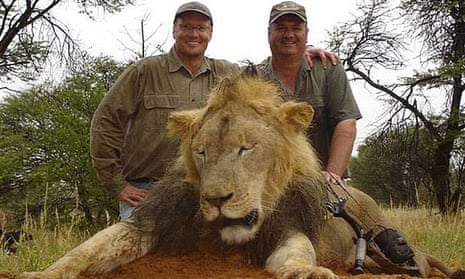The death of so handsome a creature as Cecil the lion has rightly ignited global outrage. But why do we seem to care so much more about how an animal dies than how it lives? After all, Cecil had 13 free and happy years roaming Zimbabwe’s Hwange national park. In terms of suffering, the last few hours of his life, while undoubtedly painful, can hardly be compared to the miserable factory-farmed existence of so many of the creatures that end up on our plates. Cecil’s free-range existence was circumscribed by the limitations of the park – about 14,650 sq km. The average factory chicken is afforded the living space roughly equivalent to a piece of A4 paper. And they live for about six weeks, in vast filthy sheds full of their own excrement, and without any experience of sun or fresh air. From this perspective, it may seem peculiar that we focus so much of our outrage on a small-town dentist from Bloomington, Minnesota, and hand out a CBE to Bernard Matthews.
Furthermore, what is the difference between exploiting cattle for money and exploiting lions? In theory, at least, the income from licensed hunting – redistributing cash from Bloomington to Bulawayo – is redirecting money towards the greater need. So is the Cecil furore just a bit of western sentimentality from those who can hum The Circle of Life, but who have no real appreciation of what it means? Indeed, those who left fluffy toy animals outside Dr Palmer’s dentist surgery as a protest certainly contribute towards this reading of events. After all, if Cecil had died after a fight with a fellow lion, his death may well have been no less painful.
But this economist’s reasoning misses the moral point. For what’s most troubling about this case is the pleasure of the hunt. Although we mostly kill animals for food, humans are among the very few animals that kill for pure sport and the sheer pleasure of killing. It’s odd that foxes and cats – so often the objects of animal lovers’ special care – share this trait with us. Hunting connects some people to an atavistic and otherwise incommunicable instinct that can, they say, lead to some visceral sense of oneness with the natural world. For others, such as Walter the dentist, or even Hemingway’s Francis Macomber, hunting large animals suggests something considerably more sinister. For one has to ask what sort of personal inadequacies someone is making up for if they have to travel the world to find a thrill in taking life. The fact that Dr Palmer’s weapon of choice was some high-tech crossbow seems to amplify the creepy, primal connection that he sought with the suffering of his prey.
No doubt the suburban dentist, whose life normally revolved around other people’s molars and gum disease, got to feel a little more fully alive, a little bit more alpha male, in the face of a lion’s stare. Not that Dr Palmer was bravely recreating any sort of parity with the lion, having a professional hunter with a high-powered rifle standing at his side. Moreover, many of these lions have become so used to human beings that they hardly react to their presence. No, there was nothing brave here. Photographs of a bare-chested Dr Palmer hugging a dead leopard are reminiscent of those famous Vladimir Putin shots – both men crassly trying to telegraph their masculinity. Factory farming may be more cruel to the animals. But it takes no pleasure in its cruelty. And that’s why the condemnation of Dr Palmer is fully justified.
